
FACULTY OF ARTS AND SCIENCES
Department of Sociology
GEIN 304 | Course Introduction and Application Information
| Course Name |
Applied Entrepreneurship and Innovation
|
|
Code
|
Semester
|
Theory
(hour/week) |
Application/Lab
(hour/week) |
Local Credits
|
ECTS
|
|
GEIN 304
|
Fall/Spring
|
4
|
0
|
4
|
6
|
| Prerequisites |
None
|
|||||
| Course Language |
English
|
|||||
| Course Type |
Service Course
|
|||||
| Course Level |
First Cycle
|
|||||
| Mode of Delivery | - | |||||
| Teaching Methods and Techniques of the Course | Group Work | |||||
| Course Coordinator | ||||||
| Course Lecturer(s) | ||||||
| Assistant(s) | ||||||
| Course Objectives | Entrepreneurship and innovation are the are the highest value-added elements in the new economy. This class aims to teach students interested in entepreneurship about creating awareness as applied to their career. ALL STUDENTS from ALL DEPARTMENTS would be able to select this course. |
| Learning Outcomes |
The students who succeeded in this course;
|
| Course Description | Providing theoretical information on entepreneurship and formulating a business plan, analyzing successful business models, preparing and presenting business models. |
|
|
Core Courses | |
| Major Area Courses | ||
| Supportive Courses | ||
| Media and Management Skills Courses | ||
| Transferable Skill Courses |
WEEKLY SUBJECTS AND RELATED PREPARATION STUDIES
| Week | Subjects | Related Preparation |
| 1 | Principle foundations of Entrepreneurs, Entrepreneurship, foundations of entrepreneurial thought, testing of entrepreneurial identity | Richard, Doug. (2013) How to Start A Creative Business: the jargon-free guide for creative entrepreneurs. Newton Abbot: David & Charles |
| 2 | Entrepreneurial process, developing business ideas, and creativity Techniques for solving creative problems, innovation | http://en.m.wikipedia.org/wiki/Lean_startup |
| 3 | Business plan concepts and business plan elements (market research) Researching the market with primary and secondary sources, identifying clients and their current and future needs | http://www.slideshare.net/mobile/redrocketvc/market-research-for-startups-13977653?qid=84822e7d-9803-4dd8-8366-957089d59fad&v=qf1&b=&from_search=6 |
| 4 | Business plan concepts and business plan elements (market research) Analysis of mixed marketing along the lines of the marketing plan (good, price, distribution) | http://en.m.wikipedia.org/wiki/Marketing |
| 5 | Business plan concepts and business plan elements (manufacturing, production/service plan) planning production | Workshop - Research |
| 6 | Business plan concepts and business plan elements (management plan) Considering management plan and its adaptation to the business plan Human resources management | Workshop - Research |
| 7 | Business plan concepts and business plan elements (financial plan) Finding financial sources, planning the investment, preparing the financial portrait, and principles of financial management, Accounting (budget and cash flow) | Workshop - Research |
| 8 | Market Research and workshop project according to the market plan | Workshop - Research |
| 9 | Manufacturing (production, service) plan workshop project | Workshop - Research |
| 10 | Workshop project for the management plan | Workshop - Research |
| 11 | Workshop project for the financial plan | Workshop - Research |
| 12 | Business plan concepts and a holistic view, for example business applications, sustainability, change management, and growth Information management | Workshop - Research |
| 13 | Preparing a Business Plan, Working on it, and Presenting | |
| 14 | Preparing a Business Plan, Working on it, and Presenting | |
| 15 | Preparing a Business Plan, Working on it, and Presenting | |
| 16 | Jury Presentations and Final Evaluations |
| Course Notes/Textbooks | Richard, Doug. (2013) How to Start A Creative Business: the jargon-free guide for creative entrepreneurs. Newton Abbot: David & Charles ISBN: 978-1-4463-0273-6 The Lean Startup - How Today's Entrepreneurs use Continious Innovation To Create Radically Sucessful Businesses' Eric Ries, Crown Business 2011 Web site: http://www.slideshare.net/mobile/PaulShawSmith/business-planning-for-startups
|
| Suggested Readings/Materials | http://en.m.wikipedia.org/wiki/Lean_startup http://en.m.wikipedia.org/wiki/Marketing http://www.slideshare.net/mobile/redrocketvc/market-research-for-startups-13977653?qid=84822e7d-9803-4dd8-8366-957089d59fad&v=qf1&b=&from_search=6 |
EVALUATION SYSTEM
| Semester Activities | Number | Weigthing |
| Participation |
1
|
10
|
| Laboratory / Application | ||
| Field Work | ||
| Quizzes / Studio Critiques | ||
| Portfolio | ||
| Homework / Assignments |
1
|
30
|
| Presentation / Jury |
1
|
40
|
| Project | ||
| Seminar / Workshop | ||
| Oral Exams |
1
|
20
|
| Midterm | ||
| Final Exam | ||
| Total |
| Weighting of Semester Activities on the Final Grade |
4
|
100
|
| Weighting of End-of-Semester Activities on the Final Grade | ||
| Total |
ECTS / WORKLOAD TABLE
| Semester Activities | Number | Duration (Hours) | Workload |
|---|---|---|---|
| Theoretical Course Hours (Including exam week: 16 x total hours) |
16
|
2
|
32
|
| Laboratory / Application Hours (Including exam week: '.16.' x total hours) |
16
|
2
|
32
|
| Study Hours Out of Class |
0
|
||
| Field Work |
0
|
||
| Quizzes / Studio Critiques |
0
|
||
| Portfolio |
0
|
||
| Homework / Assignments |
1
|
70
|
70
|
| Presentation / Jury |
1
|
15
|
15
|
| Project |
0
|
||
| Seminar / Workshop |
0
|
||
| Oral Exam |
1
|
20
|
20
|
| Midterms |
0
|
||
| Final Exam |
0
|
||
| Total |
169
|
COURSE LEARNING OUTCOMES AND PROGRAM QUALIFICATIONS RELATIONSHIP
|
#
|
Program Competencies/Outcomes |
* Contribution Level
|
||||
|
1
|
2
|
3
|
4
|
5
|
||
| 1 | To have the knowledge of classical and contemporary theories in sociology, and be able to comparatively analyze these theories. |
|||||
| 2 | To have the knowledge of main methodological approaches in sociology as well as social research and data analysis methods. |
|||||
| 3 | To have knowledge in the fields of general sociology, sociology of institutions, social structure and change, and applied sociology. |
|||||
| 4 | To be able to determine the appropriate methods in the design of the planning stage and conclusion of a sociological project, individually or as part of a team. |
|||||
| 5 | To be able to diagnose the social dynamics behind personal problems by using sociological imagination. |
|||||
| 6 | To be able to define social problems at local, national, and global level, and offer new policies for solutions. |
|||||
| 7 | To be able to apply commonly-used computer programs for data collection and analysis in sociological research. |
|||||
| 8 | To be able to develop a socially responsible, scientific and ethical perspective regarding the collection, analysis, interpretation and presentation of data. |
|||||
| 9 | To be able to analyze different aspects of the social world by drawing on the knowledge produced by other disciplines of the social sciences. |
|||||
| 10 | To be able to constantly renew herself/himself professionally by following scientific and technological developments in sociology and social research. |
|||||
| 11 | To be able to collect sociological data and communicate with sociologists and other social scientists in a foreign language ("European Language Portfolio Global Scale", Level B1). |
|||||
| 12 | To be able to speak a second foreign at a medium level of fluency efficiently. |
|||||
| 13 | To be able to relate the knowledge accumulated throughout the human history to their field of expertise. |
|||||
*1 Lowest, 2 Low, 3 Average, 4 High, 5 Highest
NEWS |ALL NEWS
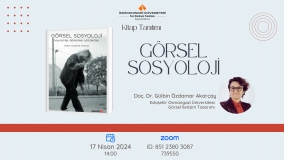
Book Presentation and Talk: Visual Sociology
Department of Sociology invites you to the Book Presentation and Talk event with Gülbin Özdamar Akarçay, the author of “Visual Sociology". Date:
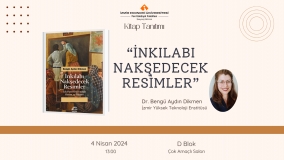
Book Presentation and Talk: Painting the Revolution
Department of Sociology invites you to the Book Presentation and Talk event with Dr. Bengü Aydın Dikmen, the author of “Painting the
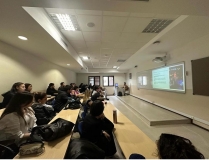
We welcomed ethnomusicologist Onur Sönmez.
We held our sociology seminar where we hosted ethnomusicologist Onur Sönmez. We thank him very much for this detailed and interesting presentation.
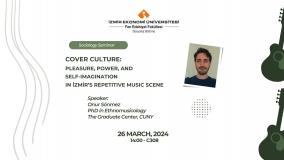
Cover Culture: Pleasure, Power, and Self-Imagination in İzmir’s Repetitive Music Scene
You are cordially invited to the Sociology Seminar where we will host Dr. Onur Sönmez. Onur Sönmez has a PhD in ethnomusicology
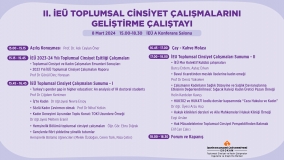
II. IUE GENDER STUDIES DEVELOPMENT WORKSHOP (EKOKAM- Gender and Women’s Studies Research and Application Center)
Research Assistant Helin Kardelen Kavuş attended the “II. IUE Gender Studies Development Workshop” on March 8, 2024, International Women's Day. Organized by EKOKAM, the workshop
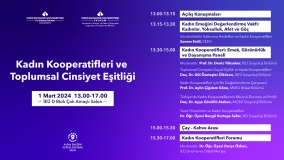
Women’s Cooperatives and Gender Equality
You are cordially invited to "Women's Cooperatives and Gender Equality", which will be co-organized by IUE EKOKAM, the Department of Sociology, and

Welcoming Our New Faculty Member: Professor Deniz Yükseker
We are proud to welcome and introduce our newest faculty member: Professor Deniz Yükseker. We wish her all the best and success
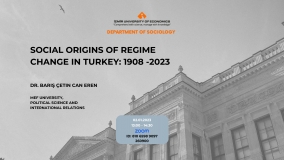
Sociology Seminar: Social Origins of Regime Change in Turkey: 1908 -2023
Department of Sociology cordially invites you to a seminar on "Social Origins of Regime Change in Turkey: 1908 - 2023" by Dr.



